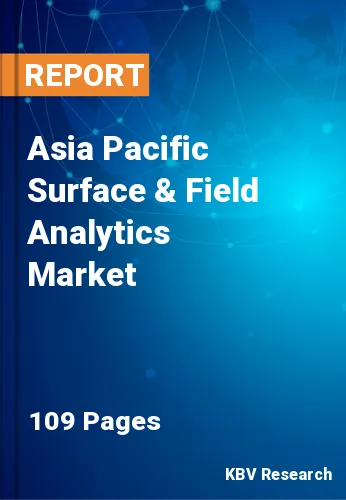The Asia Pacific Surface & Field Analytics Market would witness market growth of 10.3% CAGR during the forecast period (2022-2028).
High-resolution satellite imagery content is purchased from private companies or downloaded for free from the government website by scientists working for geospatial service providers. Larger satellites orbiting the Earth would provide high-resolution photographs to both the government and private organizations. To supply affordable satellite imagery data, many start-ups are entering the market as small satellite deployment increases. Through their SAR constellation, the companies offer synthetic aperture radar (SAR) pictures to clients in a variety of industries, including maritime monitoring, security, insurance & finance, and disaster management. The SAR data is unaffected by cloud cover and can be acquired at any time of day.
Additionally, many businesses are creating and utilizing tiny nanosatellites that may deliver geospatial & imagery data. These satellites include miniature sensors suitable for small satellites and can generate high-quality imagery at competitive pricing, allowing geospatial service providers to serve clients with limited financial resources. Small satellite utilization is predicted to rise in the surface & field analytics market as a result of the above pertinent parameters, which is further anticipated to fuel the market's expansion.
Asian cities are recognized as leaders in constructing smart cities that maximize digital information to enhance operational efficiency. For instance, Singapore frequently ranks 'as one of the smartest cities' due to its innovative policy of centrally storing vast amounts of data gathered from its residents with the government rather than with a specific business. Other nations, like Indonesia, Thailand, Vietnam, and Korea, have constructed smart cities at various stages and surmounted difficulties associated with doing so in standard urban settings. For example, Thailand is developing a smart tourism city on an island, while Vietnam used the smart city model to manage a historical center in an ancient metropolis. Hence, the increasing investment in the construction of smart cities throughout the region has increased the demand for surface & field analytics, thereby boosting the market's growth.
The China market dominated the Asia Pacific Surface & Field Analytics Market by Country in 2021, achieving a market value of $2,903.1 million by 2028. The Japan market would exhibit a CAGR of 9.6% during (2022 - 2028). Additionally, The India market would experience a CAGR of 10.9% during (2022 - 2028).
Based on Component, the market is segmented into Software, and Services. Based on Vertical, the market is segmented into Smart Cities, Energy & Utilities, Natural Resources, Automotive & Transportation, Defense & Intelligence, Government, Insurance, and Others. Based on Organization size, the market is segmented into Large Enterprises, and SMEs. Based on Deployment Mode, the market is segmented into On-premise, and Cloud. Based on countries, the market is segmented into China, Japan, India, South Korea, Singapore, Malaysia, and Rest of Asia Pacific.
Free Valuable Insights: The Worldwide Surface & Field Analytics Market is Projected to reach USD 36 Billion by 2028, at a CAGR of 9.3%
The market research report covers the analysis of key stake holders of the market. Key companies profiled in the report include Bruker Corporation, Carl Zeiss AG, Danaher Corporation, JEOL Ltd., Nikon Corporation, Olympus Corporation, Shimadzu Corporation, Thermo Fisher Scientific, Inc., Waters Corporation, and ULVAC-PHI, Inc. (ULVAC, Inc.)
By Component
By Vertical
By Organization size
By Deployment Mode
By Country
Our team of dedicated experts can provide you with attractive expansion opportunities for your business.

